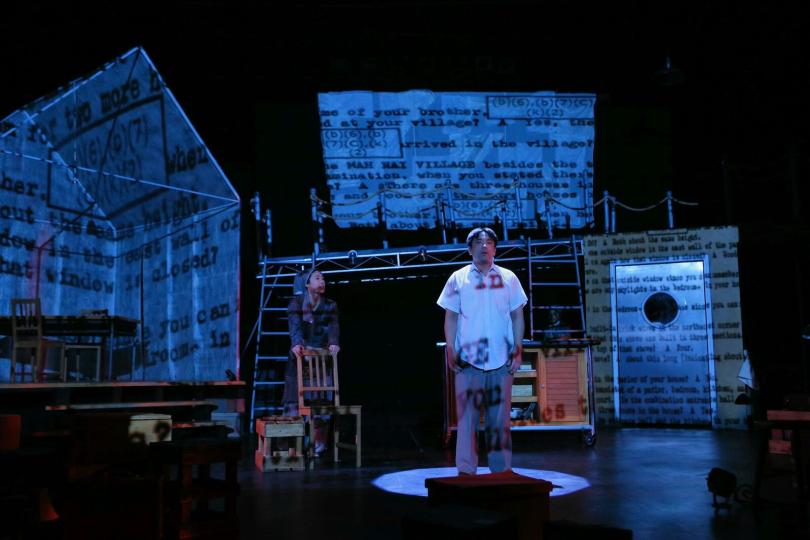Riffing on History, to Harrowing Effect

Smack in the middle of a celebratory and musical-heavy season at the History Theatre are two bold plays by emerging playwrights of color, both of which take on the theme of homegrown racial injustice. First came “The Highwaymen,” a thoroughly researched, episodic play by Josh Wilder, which took an honest look at how racism and the dictates of capitalism led St. Paul’s white city planners to destroy the historically black Rondo neighborhood in the 1960’s. Their current show, “The Paper Dreams of Harry Chin,” explores the life and psyche of a local Chinese-American man who endured countless harrowing passages in his quest to build a good life for his family by immigrating to the US.
“Paper Dreams” takes the Chinese Exclusionary act as its historical jumping-off point. Passed in 1882, it prohibited Chinese immigration to the US, even though Chinese workers played a major role in constructing the Transcontinental Railroad in the thirty years before. The Act later barred re-entry for those same workers when they left temporarily to visit family in China. As Artistic Director Ron Peluso notes, “This law was written to ease racial concerns and fears about foreigners taking jobs from American workers. This sounds sadly familiar more than 100 years later.”
The director’s message is a prescient one, but if you do head to St. Paul to see this play, bear in mind that the historical backdrop won’t be clear unless you read the program beforehand; Jessica Huang is simply not that kind of playwright. Her raw materials come not from historical archives, but from dreams, myths, and intimate conversations. The result is a surreal journey through past and present that is touching, funny, harrowing, confusing—and ultimately worth seeing.
At the start, Sheila (Meghan Kreidler) shuffles on-stage in early morning light to find that her car (a beautifully cartoonish metal and paper structure by Scenic Designer Joel Sass) has been left running in the garage. She turns it off, and it turns back on, as if possessed. In the midst of her bewilderment enters her sleepy-headed father, Harry (Song Kim). It’s a fitting start to a play that’s more about the existential confusion of being an immigrant than it is about historical events. With his daughter Sheila now into adulthood, and his American wife Laura disappeared, Harry is struggling to find his footing in middle age. The intergenerational conflict between Harry and Sheila over his next move could fill an entire play, but this is a Jessica Huang play: bring on the ghosts!
Ghosts both haunt and help in this play, and Huang has a knack for finding humor and heartbreak in their relationship to her protagonists. Harry’s best friend, Poet (Sherwin Resurrection), plays pranks on Harry at his restaurant job, and revives his memories of their arduous journey to America in the hold of a steamship. His American wife, Laura (Sandra Struthers), woos and enlivens him at first, and as the play progresses, transforms into a more malevolent force. His Chinese wife Yuet, played by Audrey Park, reminds him of his ties to home, and in a fascinating and unexpected turn, magically appears to help him navigate an abusive interrogation at the hands of an immigration officer.
When these magical appearances work, they hit hard. They are both strange and familiar, plucking strings of memory and speaking a lost language of archetypal myth. But because the play shifts time and place so incessantly, the relationships and circumstances are oftentimes too ethereal for the actors to play convincingly. The show is a real feat of engineering: its complex soundscape, detailed set, and luscious lighting design all working in harmony. But its high-concept beauty may have come at the cost of more specific actions, and well-grounded relationships, for the actors to work with.
The surprise arrival of Harry’s Chinese daughter, Susan, at the doorstep of his restaurant, heightens the stakes at the top of Act Two. Susan and Chin’s American wife, Laura, find themselves in a fascinating dance as they struggle to figure out who the other is, and what it means for their disjointed lives. But the tension is repeatedly defused by cut-aways to a simultaneous scene on the balcony above, in which Harry plays out—something, it’s not quite clear—with an immigration officer.
Though this production doesn’t cohere in a way that I, a white, classically educated, theatre-going male am used to, Jessica Huang is writing bold and innovative plays, and I suspect I'm not the only one excited to see what she dreams up next.


